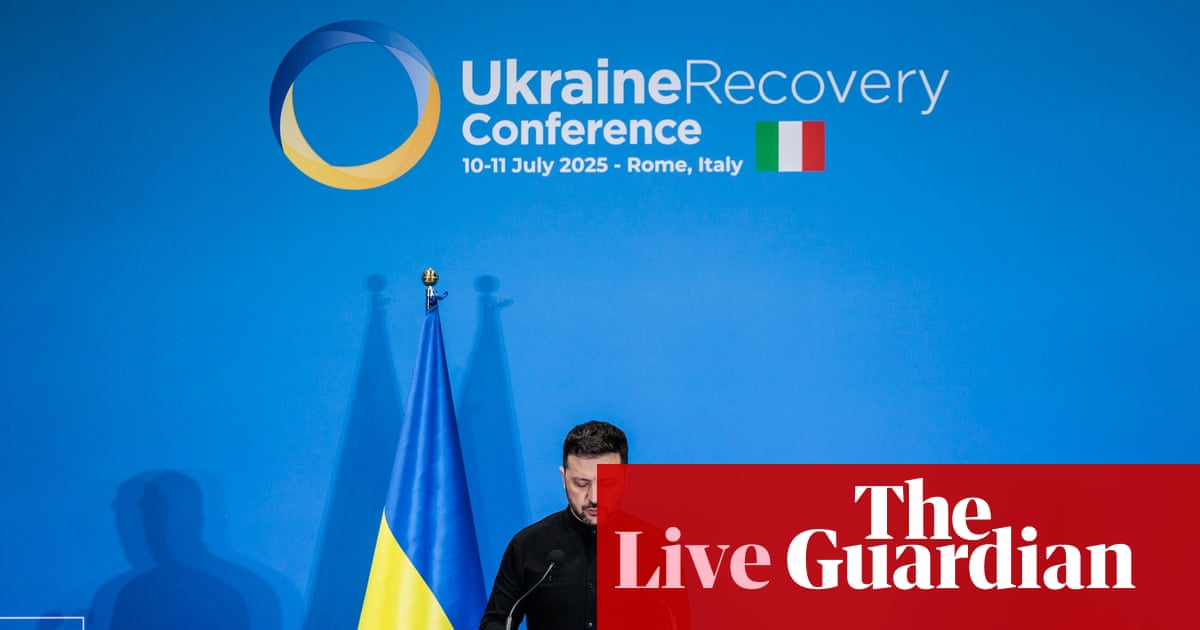Zelenskyy denies contact with EU’s von der Leyen on anti-graft law reform
Erm.
We reported on Wednesday that the European Commission said (blog) it had conveyed its concerns about the anti-graft law reform in Ukraine to president Volodymyr Zelenskyy.
This was also confirmed on Thursday, in a separate briefing (blog).
But Zelenskyy reportedly denied it today, telling reporters (via Interfax-Ukraine) that:
“I have not communicated with Ursula von der Leyen in recent days. Everything that was written about it, everything that she allegedly told me, is a fake. We did not have a conversation.”
Updated at 07.41 EDT
Key events
Show key events only
Please turn on JavaScript to use this feature
The Shahed blitz: can Russian drone onslaught break Ukraine’s resolve? Dan Sabbagh
Dan Sabbagh
Defence and security editor
Night by night, the blitz develops. Russian drones, decoys, cruise and ballistic missiles – increasingly aimed at a single city or location – are being launched in record numbers into Ukraine, straining the country’s ability to defend itself and raising questions about how well it can endure another winter of war.
General view on damages from a Russian drone strike at a residential building in Odesa, Ukraine. Photograph: Igor Tkachenko/EPA
One day earlier this month, 728 drones and 13 missiles were launched, mostly at the western city of Lutsk, home to many Ukrainian airfields. Large salvoes now come more frequently: every three to five days, rather than every 10 to 12, and civilian casualties are rising: 232 people were killed in June, the highest monthly level for three years.
A 1,000-drone attack is anticipated shortly and last weekend a German army major general, Christian Freuding, predicted that the Kremlin’s ambition was to attack Ukraine with “2,000 drones simultaneously”. Production of drones and missiles has improved, as have Russian tactics.
Ukrainian experts inspect debris at the site of a drone strike in Kharkiv, northeastern Ukraine. Photograph: Sergey Kozlov/EPA
Not only are the drones unleashed in larger swarms, with dozens of decoys included, but they are also being flown either much lower or at much higher altitudes, sometimes in a stack to fool the defenders before swooping down steeply to their target. The additional height takes them beyond the range of mobile Ukrainian gunners, whose job has been to shoot them down, relatively cheaply.
Analyses of Ukrainian air force data show that more drones are getting through: from close to 5% in March and April to between 15% and 20% in May and June. Russia is also using its Shahed drones more intelligently, analysts say, to open a path for faster and more dangerous cruise and ballistic missiles because the 50kg (110lb) explosive normally carried by a Shahed only does a relatively limited amount of damage.
Russian drone and missile strikes on Ukraine
Designed in Iran, the delta-winged Shahed 136s are now made in Russia, where they are known as Geran-2s. At least two factories have been identified, one in Izhevsk, and most notably in Yelabuga, more than 700 miles from Ukraine. The modern-looking assembly line was shown off on Russian television a few days ago, with dozens of distinctive fibreglass and carbon-fibre frames positioned to sinister effect in the background.
Israel’s foreign minister Gideon Sa’ar (C-L) and Ukraine’s foreign minister Andrii Sybiha (C-R) look at a Russian Shahed ‘Geran-2’ drone in front of the foreign ministry headquarters, in Kyiv, Ukraine. Photograph: Sergey Dolzhenko/EPA
“The Shahed problem has been foreseeable for some time. Russia has been asking itself: ‘What will be the T-34 of this war?’” said Jack Watling, a military expert with the Royal United Services Institute thinktank, referring to the tank that is considered by some to have helped the Soviets defeat the Nazis in the second world war.
Read full report:
Updated at 06.54 EDT
US criticises French plans to recognise Palestine as ‘reckless’
It has to be said that the French decision wasn’t particularly well received by the US, with state secretary Marco Rubio calling it “reckless” and saying “it only serves Hamas propaganda.”
Mike Huckabee, US ambassador to Israel, quipped that Macron did not say where a future Palestinian state would be located, AFP reported.
“I can now exclusively disclose that France will offer the French Riviera + the new nation will be called ‘Franc-en-Stine,’” he said on X.
But French foreign minister Jean-Noël Barrot defended the move on Friday, saying the French proposal went directly against Hamas’ will.
“Hamas has always ruled out a two-state solution. By recognising Palestine, France goes against that terrorist organisation,” he argued on X.
Updated at 06.17 EDT
Germany has no short-term plans to recognise Palestinian state, spokesperson says
One story we are tracking this morning is the reactions of other major European countries to the French plans to recognise Palestine, announced by president Emmanuel Macron last night.
But ahead of a E3 meeting later today – that’s France, Germany and the UK – a German government spokesperson just said that “there are no plans to recognise Palestinian state in short term”, Reuters reported.
But he said “the priority now is to take long-overdue steps towards two-state solution”, promising to “increase pressure if progress is not made”.
The Italian foreign minister Antonio Tajani said earlier that the recognition of a Palestinian state needs to be directly linked with its recognition of Israel, or otherwise “the problem will not be solved”.
Updated at 05.56 EDT
Kneecap lambast Viktor Orbán over ‘outrageous’ ban from Hungary
Kevin Rawlinson
Meanwhile, the Irish hip-hop band Kneecap have criticised Hungary’s far-right prime minister, Viktor Orbán, after they were banned from entering the country for three years ahead of a scheduled appearance at a music festival there.
Moglai Bap and Mo Chara of Kneecap perform at Glastonbury Festival at Worthy Farm in Pilton, Somerset, Britain. Photograph: Jaimi Joy/Reuters
The group, who are outspoken supporters of Palestine, were due to perform at Sziget festival on 11 August. But the Hungarian government spokesperson Zoltán Kovács said on Thursday they had been banned because their “members repeatedly engage in antisemitic hate speech supporting terrorism and terrorist groups”.
He said:
“Hungary has zero tolerance for antisemitism in any form. Their planned performance posed a national security threat and, for this reason, the group has been formally banned from Hungary for three years. If they enter, expulsion will follow under international norms.”
Responding in a post on X, the group said:
“To the tens of thousands of fans who we were buzzing to see in person at Sziget, we’re sorry we won’t be with you.
The authoritarian government of Viktor Orban say we ‘pose a national security threat.’ Which is fucking outrageous coming from a man who welcomed Netanyahu, a wanted war criminal, like a hero just a few weeks ago.
There is no legal basis for his actions, no member of Kneecap has ever been convicted of any crime in any country.
We stand against all hate crimes and Kneecap champions love and solidarity as well as calling out injustices where we see it. It’s clear this is political distraction and a further attempt to silence those who call out genocide against the Palestinian people.”
Kneecap have had several shows cancelled in recent months, including at TRNSMT festival in Glasgow and at the Eden Project in Cornwall.
ShareMajor archeological sites in Greece closing during day as heatwave continues Helena Smith
Helena Smith
in Athens
Over in Greece, the culture ministry has announced that it will be extending a ban on opening hours of all archaeological sites, including the Acropolis, in Athens after the weather service predicted that scorching temperatures were unlikely to recede until Monday.
A tourist holding an umbrella against the sun passes by the Acropolis hill which remained closed for five hours due the new heatwave in Athens, Greece. Photograph: Thanassis Stavrakis/AP
The worst of the heatwave is likely to hit today and tomorrow.
“Archaeological sites will remain closed between 12:00 to 17:00 due to high temperatures for the safety of workers and visitors,” the ministry said in a statement released mid-morning today.
ShareDevastating wildfires in Cyprus leave at least two dead, dozens injured Helena Smith
Helena Smith
Elsewhere, wildfires, described as the worst in more than half a century, have devastated large tracts of southern Cyprus, leaving at least two dead, dozens injured and hundreds displaced.
Smoke fills the air as firefighters battle a forest fire the Cypriot village of Omodos, in the Limassol province. Photograph: Etienne Torbey/AFP/Getty Images
As the EU announced it would send in water-bombing planes, after the island requested help though the bloc’s civil protection mechanism, an estimated 250 firefighters battled to contain blazes raging on multiple fronts.
By midday Thursday, nearly 24 hours after breaking out, the infernos had consumed more than 40 square miles of territory, decimating prime agricultural land and dozens of homes in village communities outside Limassol on the Troodos range.
A British helicopter drops water over Omodos village, Cyprus. Photograph: Petros Karadjias/AP
Charalambos Theopemptou, the Green MP who chairs the Cypriot parliament’s environmental committee, spoke of a “tragic situation” with blazes fuelled by extreme weather and gale-force winds.
Temperatures nudging 44C in several parts of the east Mediterranean island were forecast to rise further Friday as a week-long heatwave intensified across southern Europe.
“We haven’t seen such devastating fires since the Turkish invasion in 1974,” he told the Guardian.
“It’s tragic, people have died, 72 houses and 91 cars have been burned, it’s absolute chaos and that’s also because preventative measures haven’t been taken … scandalously and tragically the public warning system, an EU directive voted into law back in 2022, has not been implemented.”
As a result, panic-stricken people had attempted to outrun the flames in their cars.
“Narrow streets in small communities were jam-packed and that’s how people died,” Theopemptou said.
People try to put out a fire at Souni village in Limassol, Cyprus. Photograph: Xinhua/Shutterstock
“The government has made a real mess of things. Illegal waste dumps haven’t been cleared, [inflammable] vegetation hasn’t been removed, basic infrastructure like big cement water tanks and hose pipe points aren’t in place, all of which has helped the fires spread.”
By late Thursday, Greece, Egypt, Israel and the UK, which has an RAF base on the divided island, announced they would also be weighing in with air support and fire fighters.
Turkish Cypriots in the breakaway north have also offered to help with some going so far as to gather food and supplies for those in fire-stricken areas.
ShareGermany to pay for two Patriot systems, Norway one – Zelenskyy
In further comments from Zelenskyy, he confirmed that Germany will finance two Patriot systems, and Norway will pay for one, with further talks under way, including the Netherlands.
In addition to securing air defence supplies, Ukraine needs to cover a financing gap of $40bn next year, Zelenskiy said in remarks released by his office and reported by Reuters.
ShareMorning opening: Ukraine eyes 10 Patriot systems, direct meeting with Putin Jakub Krupa
Jakub Krupa
Ukraine is looking to secure funding for 10 Patriot air defence systems under the deal agreed with US president Donald Trump, with active diplomatic efforts to find sponsors for all of them, Volodymyr Zelenskyy said.
President of Ukraine Volodymyr Zelenskyy attends the parliament session in Kyiv, Ukraine. Photograph: Vadym Sarakhan/AP
Previously Germany suggested it could pay for two systems, with Denmark, the Netherlands and Sweden among other European countries declaring their support for the initiative.
In comments released to journalists on Friday, Zelenskyy also insisted he “listened and responded adequately” to concerns over the anti-graft law, with the new bill now being proposed to resolve concerns about the anti-corruption agencies’ independence.
He also admitted that there should “probably have been more of a dialogue” before the original law was adopted, AFP noted.
The president added:
“I am focused on the issue of the war because right now, the number one issue in Ukraine is the war. The biggest problem is the war. The main enemy is Russia.”
Zelenskyy suggested that Russian and Ukrainian negotiators started discussing a direct meeting between him and Putin in another bid to end the conflict.
“In talks with us, they have begun to discuss it. This is already progress toward some kind of meeting format.”
Elsewhere, I will be looking at the E3 meeting of the UK, France and Germany on Gaza and Palestine, which will surely attract more attention after the French president, Emmanuel Macron, pledged to recognise the state of Palestine in September.
Separately, Baltic defence ministers are meeting with US defence secretary Pete Hegseth in Washington, as we also await updates on the much-awaited EU-US trade deal.
I will bring you all key updates from across Europe today.
It’s Friday, 25 July 2025, it’s Jakub Krupa here, and this is Europe Live.
Good morning.
